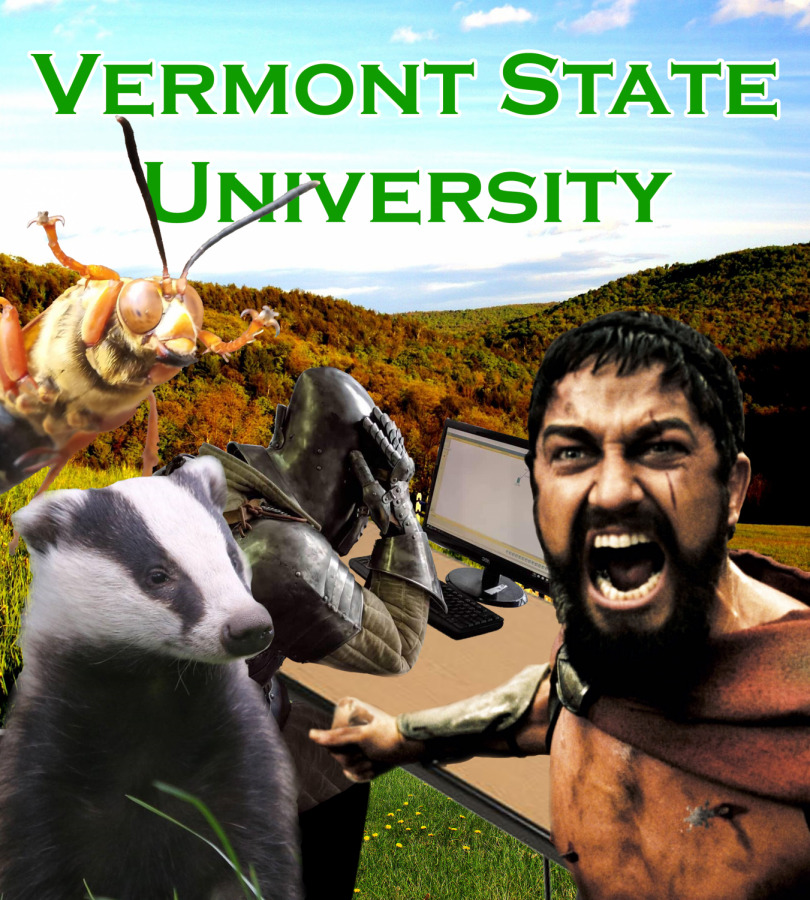Yes, we can hear you: VSCS Board of Trustees approves Vermont State University name
On Wednesday, Sept. 29, 2021, the Vermont State Colleges Board of Tr
ustees voted on and approved Vermont State University as the name for the newly consolidated entity which will accredit campuses in Johnson, Lyndon, Castleton and Randolph as a single institution of higher education.
The special meeting, which lasted two hours, was called following a presentation by VisionPoint Marketing at the board’s Sept. 21 meeting. VisionPoint was hired by the VSCS in June and conducted research into suggested naming and branding for the new university.
The meeting began with remarks by VSCS Chancellor Sophie Zdatny. She outlined the history of the modern transformation efforts and the reasons it has been pursued. Due to chronic underfunding of public higher education by the state of Vermont, the VSCS has been fiscally unstable for decades, and the economic turmoil of the pandemic served as a catalyst.
“The Select Committee [on the Future of Higher Education in Vermont] had unanimously recommended that the Vermont State College System bring together Castleton University, Northern Vermont University and Vermont Technical College under a single accreditation and a single leadership structure,” she said.
The vote was preceded by a period of public comment in which students, staff, faculty, alumni and other community members were given opportunities to voice their feelings. The tones and sentiments of these messages to the board were passionate and varied.
Perhaps the most common comment to the board was that of maintaining campus name tags as part of the Vermont State University name. The pride of campus identity and culture were clearly of great priority to almost all who opposed the name change.
Many suggested a structure similar to that of NVU and many other unified institutions — for example: Vermont State University-Johnson. Others, however, especially those from Castleton, felt reference to the campus should precede the name of the university — for example: Johnson, a Vermont State University.
This suggestion was made often in an effort to accentuate the importance of maintaining campus identities despite becoming a consolidated entity. Many who spoke worried the coming unification and renaming would result in muddying of the distinct cultures which exist at the system’s various locations.
Chief Financial and Operating Officer of the VSCS Sharron Scott said including such identifiers in a master brand “limits our ability… to have economies of scale when it comes to purchasing our marketing and purchasing names and materials.”
However, she added, “that does not, though, prevent us being able to have brand pillars or other activities that really allow us to be able to differentiate by a location or by functional responsibilities like technology.”
As Northern Vermont University is in itself a changed name and identity, one conglomerated from the former Lyndon and Johnson State Colleges, most opposing voices came from Castleton and Vermont Tech, both of whom place large senses of identity on their names.
“From the Castleton name and Spartan mascot, down to the small detail of Castleton green, we’re known and respected,” said Gabrielle Tamasi, a Castleton alum. “It would be a detriment to the entire state college system to lose this strong identity.”
When the board responded to the comments at the end of the meeting, many acknowledged this concern. “I agree with everyone… we don’t want to lose the feelings of the individual campuses,” said trustee Susan Zeller. “And I think the new name allows for that, as many people talked about.”
Rich Clark, program coordinator of political science at Castleton, said he felt the name change was rushed and viewed it as potentially damaging. “I think we’re moving way too fast with changes which may be irreversible… we are rushing into critical surgery without doing necessary tests.”
Board member Shawn Tester noted how the sense of urgency surrounding transformation can give the impression of a rushed process with little forethought. “Maybe we need to do better education amongst all our stakeholders of just how dire this situation has been.”

Clark indicated a sense of pride surrounding the Castleton name and identity, describing it as “proven and successful,” and he told the board, “I don’t know why we’re going to put that at risk.”
Lisa Pleban, program coordinator of practice in teaching physical education at Castleton, stressed the hard work being done both at campus and administrative levels, but expressed that it often felt students, staff and faculty were left out of important decision-making processes and were not being given full information.
“Beware of people who make decisions for you when you’re not at the table…” she said. “I would like to know what the benefit to cost is for this name change. Show me the numbers.”
Alongside Clark, she suggested that the board pause and take further time to consider the ramifications of a name change. This sentiment was shared by Vermont State Senator Brian Collamore, who serves Rutland county.
“There are 20 plus legislators in the Rutland county delegation,” he said. “I have not surveyed all of them, but I feel confident when I say the great majority of them are strongly opposed to the name change as it has been proposed.”
Collamore also noted that he had spent an hour taking calls for local radio station to survey Rutland county residents. “Every call we received opposed the change as well,” he said.
Statements such as this came overwhelming from the voices of Castleton community members, for whom transformation is a new and frightening experience. The NVU community, having been through transformation just years prior, had fewer speakers during the meeting and often expressed less outrage.
“I understand why folks from Castleton are wounded by these sorts of moves,” said Keith Chamberlain, an alum from Lyndon State College. “Certainly we [NVU] understand it better than most.”
Chamberlain expressed support for the new name, but he agreed with others that campus identity is important, though he did so with a degree of optimism, saying that the focus of the new university name should be on the campus location rather than the system as a whole.
“From the standpoint of recruiting students and how they perceive the brand, it doesn’t change that much,” he said, “and it will actually give Lyndon and Johnson a chance to reclaim their brands.”
Melissa Weinstein, who formerly worked for JSC and then NVU, said her experience with the Johnson-Lyndon merger has given her helpful context in handling the current unification. She said she supports the name change but is familiar with the pain that will come alongside it.
“Our well-justified sense of campus pride and history is very connected to our name, and rebranding can feel like a betrayal…” she said. “But the fact is, this isn’t the first or even the second time that Johnson, Lyndon and Castleton have changed their names in order to meet the demands of an evolving educational marketplace.”
NVU-Johnson’s Chair of Writing and Literature Tyrone Shaw praised the strength and quality of the new name, noting that it had originally been proposed in the ultimately rejected Labor Task Force’s plan for unification 18 months ago.
However, he also criticized the attitudes of many members of the Castleton community for their vitriolic remarks, especially those being made across social media platforms.
“At the onset of Northern Vermont University, Lyndon and Johnson State Colleges — historical rivals — went through a period of grief and anger at the prospect of losing their individual identities, but never sunk to the level of calumny we have seen of late, by some, directed toward NVU in particular,” he said, ending his time with a call for unity and a request for civility.
“I really don’t care what the name is,” said board member Shirley Jefferson. “What I care about is that we keep providing these community colleges for the underrepresented people here in Vermont.”
Jefferson said she values what the state colleges give back to the people of Vermont, praising them for their commitment to providing education to first generation learners, as well as to non-traditional students, such as commuters, adult learners and early college students.
Gabriel Wilkinson, who serves as the student council president for Vermont Tech, spoke up with a more tempered concern about the name change. “VTC is a different school than the rest of the colleges. We’re a technical school, and losing that part of our name ends up stripping us of who we are.”
Wilkinson said he had been gathering comments from students and hearing many of the same points — a loss of identity, added confusion and fear of the unknown. “Having the school end up existing after all of this is what I care about and what most of the kids here care about,” he said.
Trustee Bill Lippert referenced Wilkinson’s comments during his own response to the public comments. “We need to not lose sight of the fact that our mission is to preserve public higher education for Vermonters.”
Board member Karen Luneau shared this sentiment and said, “I believe that we cannot sustain a democracy and our way of life without high-quality public education.”
The VSCS Board of Trustees, the Chancellor’s Office and the Vermont State Legislature all have committed to preventing campus closures. Unification was determined to be the necessary step to avoid such disasters, as were suggested at the crux of this funding crisis during the beginning of the COVID-19 pandemic by former Chancellor Jeb Spaulding, who then stepped down from his position.

Senior, Creative Writing
From Fletcher, VT
Spring 2020-Present
"Call me mommy and I'll bring you blankets and hold you while you cry."



